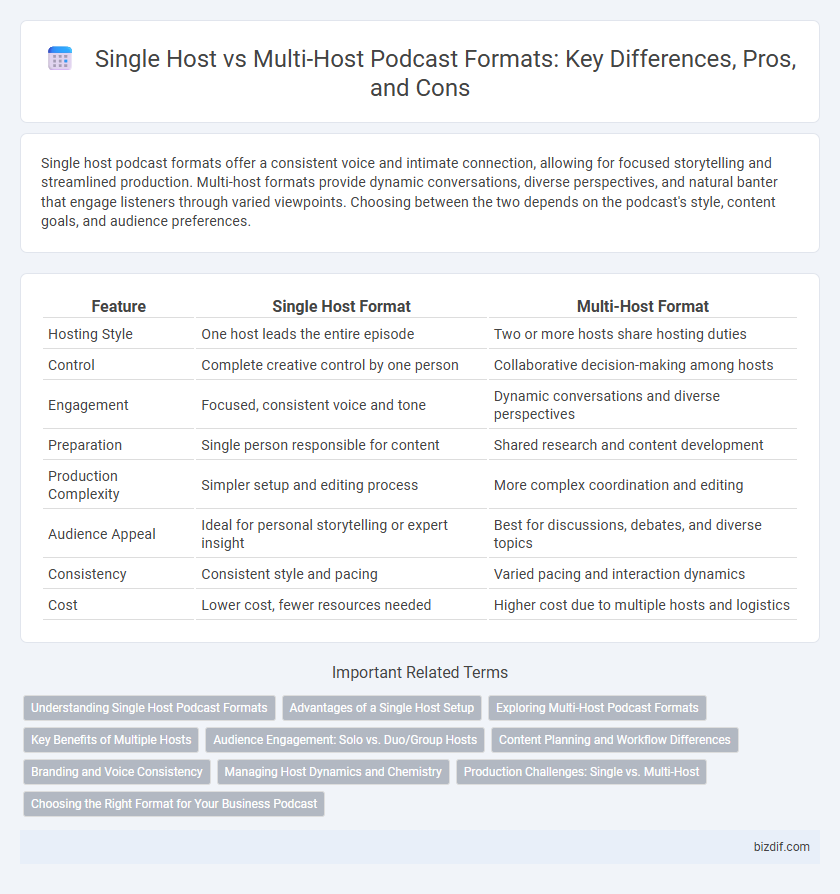Single host podcast formats offer a consistent voice and intimate connection, allowing for focused storytelling and streamlined production. Multi-host formats provide dynamic conversations, diverse perspectives, and natural banter that engage listeners through varied viewpoints. Choosing between the two depends on the podcast's style, content goals, and audience preferences.
Table of Comparison
| Feature | Single Host Format | Multi-Host Format |
|---|---|---|
| Hosting Style | One host leads the entire episode | Two or more hosts share hosting duties |
| Control | Complete creative control by one person | Collaborative decision-making among hosts |
| Engagement | Focused, consistent voice and tone | Dynamic conversations and diverse perspectives |
| Preparation | Single person responsible for content | Shared research and content development |
| Production Complexity | Simpler setup and editing process | More complex coordination and editing |
| Audience Appeal | Ideal for personal storytelling or expert insight | Best for discussions, debates, and diverse topics |
| Consistency | Consistent style and pacing | Varied pacing and interaction dynamics |
| Cost | Lower cost, fewer resources needed | Higher cost due to multiple hosts and logistics |
Understanding Single Host Podcast Formats
Single host podcast formats offer a streamlined and consistent listening experience, allowing the host to establish a strong personal connection and maintain focused content delivery. This format simplifies production logistics by eliminating coordination between multiple voices and ensures a clear, authoritative narrative that resonates with the audience. Popular in storytelling, educational, and niche topic podcasts, single host formats enhance brand identity and listener loyalty through direct, uninterrupted communication.
Advantages of a Single Host Setup
A single host podcast format offers a consistent voice and style that builds a strong connection with the audience, enhancing listener loyalty and brand identity. It simplifies production logistics, reducing scheduling conflicts and streamlining content planning. This setup allows for greater creative control and focused storytelling, ensuring a clear and engaging narrative flow throughout each episode.
Exploring Multi-Host Podcast Formats
Multi-host podcast formats foster dynamic conversations, enabling diverse perspectives and enhanced listener engagement through interactive dialogues. They provide opportunities for natural banter, varied expertise, and deeper topic exploration compared to single-host shows. This format also allows for shared hosting responsibilities, reducing individual workload and increasing content consistency.
Key Benefits of Multiple Hosts
Multiple hosts in a podcast create dynamic conversations that enhance listener engagement through diverse perspectives and spontaneous interactions. This format fosters a sense of community and rapport, making the content more relatable and entertaining. Additionally, sharing hosting duties can improve content consistency and reduce workload, leading to sustained podcast quality over time.
Audience Engagement: Solo vs. Duo/Group Hosts
Single host podcasts create a focused, intimate listening experience that fosters a strong personal connection and encourages loyal audience engagement. Multi-host formats spark dynamic, natural conversations that introduce diverse perspectives and maintain high energy, appealing to listeners who enjoy varied dialogue and group chemistry. Audience interaction often increases in duo or group settings due to the interplay of differing viewpoints and spontaneous banter.
Content Planning and Workflow Differences
Single host podcast formats allow for streamlined content planning with a singular vision, reducing coordination efforts and enabling faster episode production. Multi-host formats require detailed workflow management to balance diverse perspectives, schedule recording sessions, and coordinate editing responsibilities among multiple contributors. Efficient communication tools and content calendars are crucial in multi-host setups to maintain consistency and quality across episodes.
Branding and Voice Consistency
Single host podcast formats create a strong, cohesive brand identity by offering a consistent voice that listeners easily recognize and trust, enhancing audience loyalty. Multi-host formats introduce diverse perspectives and dynamic interactions, which can broaden appeal but may challenge maintaining a unified brand voice. Consistent branding in single host podcasts drives clearer audience expectations, while multi-host podcasts require deliberate alignment in tone and messaging to ensure voice consistency across episodes.
Managing Host Dynamics and Chemistry
In podcasting, managing host dynamics is crucial for maintaining engaging content, with single host formats offering consistent tone and streamlined decision-making, while multi-host formats provide diverse perspectives and interactive chemistry that can enhance listener connection. Effective communication and clear roles are essential in multi-host podcasts to balance airtime and avoid conflicts, fostering a natural conversational flow. Building authentic rapport and practicing active listening contribute significantly to a seamless and compelling listener experience, regardless of the number of hosts.
Production Challenges: Single vs. Multi-Host
Single-host podcast production simplifies scheduling, editing, and maintaining a consistent tone, reducing overall workflow complexity. Multi-host podcasts introduce challenges such as coordinating diverse schedules, balancing multiple voices, and managing more intricate audio mixing to ensure seamless conversations. Effective communication and pre-recording preparation are essential to mitigate these production hurdles in multi-host formats.
Choosing the Right Format for Your Business Podcast
Single host podcast formats provide consistent branding and a clear, authoritative voice that establishes trust and expertise in your industry. Multi-host formats offer dynamic discussions, diverse perspectives, and increased listener engagement, enhancing content depth and variety. Businesses should evaluate target audience preferences, content goals, and resource availability to select a format that maximizes impact and aligns with their marketing strategy.
Single host format vs Multi-host format Infographic

 bizdif.com
bizdif.com